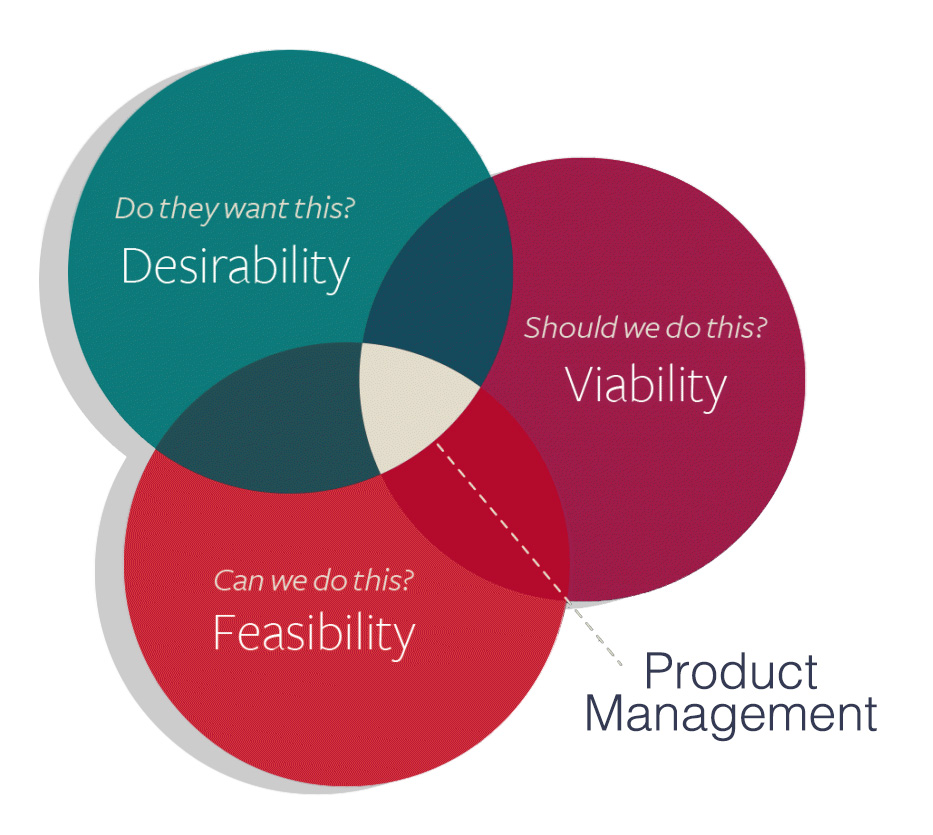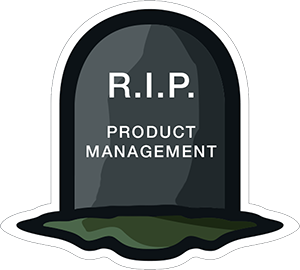The Product Manager role has gained prominence in recent years as companies are becoming more Agile focused to better innovate and compete, where customers expectations are constantly climbing along with the accelerating pace of innovation. This makes Product Management exponentially more difficult, while at the same time an increasingly critical element of innovation for most organizations.
So why is the Product Manager role dying at this critical time? Before we dive into that, let’s review why the Product Manager role is so critical…
The Product Manager Role

The Product Manager role typically varies by company, but they’re the ones responsible for developing kick*ss products for an organization, known as the practice of product management. They’re responsible for developing the product vision & strategy, as well as strategically driving product development, market launch, and ongoing improvements.
They define the product strategy, roadmap, and feature definition through the lens of their business’s strategic goals, specific customer needs and broader market opportunities, product data, and financial resources available. They work at the intersection of UX/design, technology, and business, and are constantly seeking the answers to these questions:
- Do our customers want this feature or product?
- Can we build this feature or product?
- Should we build this feature or product?
Top 5 Problems that Are Killing Product Management
You can see from above how critical – and strategic – the Product Management function is at designing, developing, and deploying kick*ass products. I’ve worked with a ton of product teams, and unfortunately Product Managers are just not well understood, utilized, and/or respected. Here’s my top 5 reasons that Product Management is slowly dying…
Problem #1: Lack of a Defined Role
The lack of a defined Product Manager role plagues most product organizations, especially those that are new to Agile. Product Managers are usually the least known in terms of their role and responsibilities are every day, and their role can be vastly different from one company to the next.

Without a defined role, I tend to see most Product Managers get cast as Project Managers who simply manage the development schedule, where all the strategic components of the role are stolen by executives or even another department (see problems #3 & #5 below) in a power grab. This will have disastrous consequences on products, the customers, and even the company’s bottom line.
Problem #2: Responsibility Without Authority
One of the biggest problems of Product Management is the massive amount of responsibility for the product with very little lack of authority over the team. Sure, matrixed organizations are the norm, but that doesn’t mean you can’t give your Product Manager authority to run and manage the product team as they see fit.

For example, I’ve seen product teams humming along, and then out of nowhere, a VP or Director of UX, engineering, QA, whatever, will add new members to the team “to speed things up.” Because Product Managers don’t really “own” the team, they can only say yes and do their best to integrate the new team members. The lack of authority can put Product Managers in bad situations, even babysitting folks who don’t belong on the product team. Or worse, new team members causing major disruptions because they lack Agile knowledge and/or experience.
Problem #3: Executives Don’t Understand Agile
Once organizations go through Agile transformations, many tend to fall into the same old bad habits. Especially executives, who typically don’t attend Agile training or try to pick it up with a crash course. Then bad things happen.

And I’ve seen it all… from executives still keeping the same project plans, portfolio management, and budgeting functions in place. Even continuing to dictate the product prioritization without getting involved in discovery activities and/or engaging with customers weekly to understand their needs. Or worse, getting too involved in product teams and thinking they know more than anyone else… ever get demands from executives to stop everything mid-sprint, make a change/fix, deploy, and then continue on with the sprint?? Yikes.
Problem #4: Technical Focus Over Creativity and/or Business
As I mentioned in my previous post, Why Creatives Make Kick*ss Product Managers…
“The Product Management role is becoming overly technical and highly mundane, often leading to the deployment of crappy products. One major problem is that companies heavily rely on engineers to develop creative products and solutions, instead of, well, Creatives!”

This is true for a lot of product teams, where they’ve made the role too technical when someone with a creative or business background — along with experience in Agile, user research, and/or business strategy — can readily assume the role.
But what happens when the product requires technical direction?
This is what a Tech Lead is for, duh! Or if it’s super technical, then it should be escalated to the technical architect. But Product Managers aren’t supposed to be technical (except for technical PM roles), nor are they supposed to be tech architects. It simply isn’t necessary.
Problem #5: Allowing Other Groups to Drive Product Decisions

Another common problem in organizations is when other groups within the organization have final say on product decisions. This happens when executives lack the knowledge of Product Management’s purpose as a value-driver, and allow other teams — mainly business-focused teams — to undermine the Product Manager’s decisions on product direction and strategy. This is affectionately known as the “swoop and poop,” especially if the other team isn’t actively engaged with the Agile process.
It’s one thing to collaborate with stakeholders and ensure alignment on the product strategy & roadmap, but it’s absolutely debilitating to sit on the sidelines and watch as other teams make key product decisions that often steer the product in the wrong direction.
Conclusion
It might not be that difficult if you’re only dealing with just one of the problems stated above, but it’s often the compounding negative effects of having to deal with all of these problems – at the same time – that truly lead to very bad product things.

Successful products need highly capable Product Managers to effectively define a product direction that exceeds customer needs & expectations, optimizes investments, and produces value for the organization. But it’s a shitshow out there now with so many organizations failing to adequately support Product Management, and wasting money, careers, and market share along the way.
If organizations don’t turn things around, then it’s only a matter time before the Product Management function dies.
Is Product Management dying at your organization? If so, leave a comment below and let us know…



I have to disagree on your point about product managers not needing to be technical.
We’re talking software products – which often or always means APIs and curating a developer community. A successful software product manager must also be a capable developer.
If you haven’t programmed and can’t handle product architecture you’re not going to be allowed to own the product team or own the product decisions.
I’d argue most product managers aren’t technical enough which causes most of the problems you’re mentioning n your article.
I always work my credibility with the tech leaders first and once I have their support I use that as leverage to keep the business leaders in line.
The problem I see with the industry is the conflating of an agile product owner who doesn’t need to be technical with a real software product manager. These are totally different roles!
LikeLike
Good post. Good rationale. Wrong conclusion. First product management has been around alot longer than Agile. I was one, aloing with MANY others, in the 1980s and 1990s. It was actually started/created by Neil McElroy in the 1931 at Proctor and Gambe ( 51331.org). Second, its alwaysw been poorly defined. Why? Organization behvior nad power issues. In small oiganizations, you have the founder/owner who wont give up contro and defintion of their product/baby. So the PM is bascially neutered. In larger organizations, particuyaly B2B, the power struggle between Sales and Engineering, and PM sitting in the middle, creates difficulty in role defintion. Unless the Exec gives the PM org power/air cover, it will be a ‘hey boy’ for engineering or a glorified demo dog for sales. These problems have existed for 40 years. Yet PM is in its most valued postion ever. For the first time we have VP of Product and Chief Product Officers. That is relatively new and means there is a seat at the table unlike the past. These again arent PM issues; they are organizaitonal power issues. And If a company wants to scale with multiople products, it cant unless someone. whether labeled PM or not, does the role. Period. So its short sighted to thunk PM is dead. Its functions are alive like it or not. And smart companie allow it to have the powerr it needs for the good of their business.
LikeLike
Thanks for the insightful comment Greg.
First, I should have added the caveat that I was only referring to digital Product Managers vs brand/marketing Product Managers. And while I do agree that there’s a lot more VP of Product and Chief Product Officers now than ever before, many of those folks are actually hold-overs from the bygone Waterfall era and are contributing to the decline of the PM role by participating in some/all of the issues I listed above.
Lastly, yes products are continuing to get built, but I would argue that there’s only a small fraction (perhaps 2-3%) of the 2 billion websites, 3 million mobile apps, and thousands of wearable digital products that are built well and have achieved any real success. Beyond that, the proof is in the pudding of the stats I listed above… 98% of the digital products that are built now are garbage mainly due to the reasons I listed above. If companies don’t change their ways quickly, then I would predict that Product Management will cease to exist within most companies and they’ll simply outsource the PM function and focus on the business itself.
LikeLike